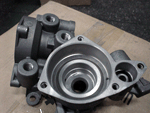
We recommend compressing your files before sending them (using ZIP or similar). IGES files in particular can often be compressed to 10% of their original size.
Is the tool destined to be used in China or in your own country? If Titoma fabricates the parts for you in China, we can offer you much cheaper tooling prices (sometimes half as expensive) because local Asian components can be used. This includes for example Yudo hot-runners from Korea, offering better quality than DME and very good service. Imported hotrunners like those made by PSG sell in China for as much as 6 times the European price.
For export tools Titoma will need to know exactly which injection machine the tool will be used on and in which geographical area. We build tools with any Western brand name components you specify, which makes repairs and replacements simple.
The general export tooling process is as follows:
How many plastic parts will be ordered in each lot? Most injection molders prefer runs of at least 5,000 pieces, but short runs are also available.
The problem with short runs for injection molding is that for each production run the tool must be taken out of storage, mounted on the injection machine, warmed up and tuned. In general the first 30 injection shots are wasted, and after use, the melted plastic must be cleaned out of the machine for the next run. For these reasons, costs can go up quite a bit for short runs, so we always recommend that our clients combine lots together as much as possible, which also saves on transportation.
For production orders worth less than US$ 5,000 Titoma normally charges a setup fee of US$ 400 per tool per run, although for large tool packages Titoma sometimes offers the first run as part of the tool test procedure, so the fee may not apply for that first run.
How many parts do you need the tool to be able to make in the coming years? A standard P20 steel China tool can offer around 200,000 cycles, but with harder grade/hardened steel, the tool can often do a million or more.
Titoma can do rapid tooling using our proprietary modular tooling system, resulting in real tooled plastic parts in 2 to 3 weeks. We can use aluminum (soft, quick to mill) or P20 steel (the standard in China) or even S7, a very hard, long lasting steel. These rapid tools are guaranteed to produce 50,000 cycles, but in practice can often do close to 100K. Normal tools take 5 to 6 weeks in Taiwan and 6 to 8 weeks in China.
If you wish to produce a lot of parts per month, Chinese Plastic Injection Molding can provide a tool with 2, 4, or 16 cavities. For example, for a tool with 2 cavities, each time the plastic injection machine runs a cycle of injecting, cooling, opening, and pushing out parts, 2 plastic parts would be made instead of one. Multiple cavities multiply speed and they also reduce costs because less machine time is used per part and less plastic is wasted. A 2-cavity tool costs roughly 1.6 times as much as a 1-cavity tool.
It is important for us to know beforehand which kind of plastic will be used to make your parts , as different kinds of plastic have different shrink rates. The 3D models our engineers make are exactly the size the final parts should be, but the tool makers actually make the tool core slightly larger, so that when the hot plastic cools and shrinks, parts of the correct size will result. If changes are made to plastic types after tool design, tools may need to be reworked, and charges are incurred during this process.
Many of our clients use ABS plastic, and there are also many others such as PP, PET, POM, rubber, etc. to choose from. We can also add glass fiber to give parts extra strength.
The choice depends on what you need the parts for, and under which circumstances the plastic parts will be used. The choice of plastic also affects the parts and tooling in several ways; for example, the use of plastics filled with glass fiber will shorten your effective tool life because the fibers erode the metal.
Our engineers are happy to give you advice in this choice. If you are uncertain about the type of plastic you desire, Chinese Plastic Injection Molding can first use a CNC machine to mill prototypes of your parts and then make replicas in different kinds of plastic using a silicone rubber mold.
We will need your company address, telephone number, and email address. Does your company have a website? Who do you wish us to communicate with for various types of information requests?
The preceding information is a summary of what we normally need to ask before providing quotes. Please do not hesitate to ask if you have further questions about what Titoma may require in order to best serve your needs.
We look forward to getting to know you better and serving your tooling needs.